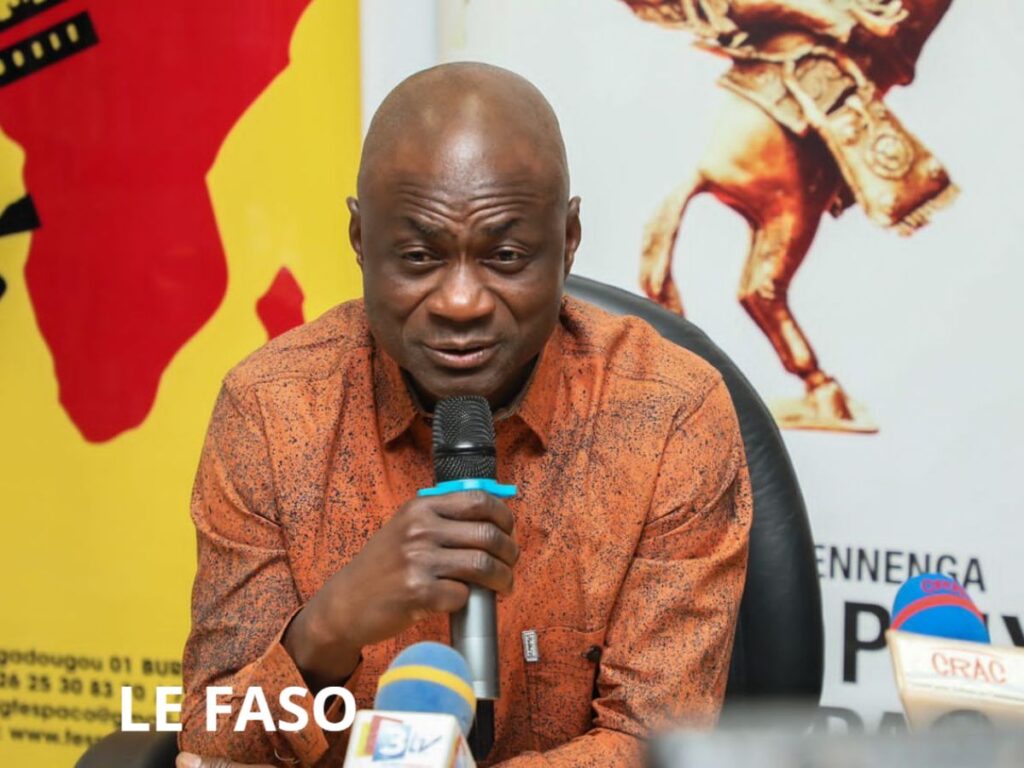Prefer to listen? This newsletter is now available in audio format—an AI-generated version of my voice (5 minutes)
In late April, Burkina Faso’s state newspaper Sidwaya published a long, wide-ranging, and revealing interview with Moussa Alex Sawadogo—the former Delegate General of FESPACO and now Director of the newly created Agence Burkinabè de la cinématographie et de l’audiovisuel (ABCA). The agency, formed just weeks after the festival ended in early March, now oversees FESPACO along with the national film school and other key cinema institutions. In effect, the person who ran FESPACO from 2021 to 2025 now controls the policy framework that will shape its future.

It’s quite an impressive back-and-forth, actually! Across nearly 10,000 words, the reader is treated to something rarely seen in African film discourse: a detailed, unapologetic account of how a major cultural institution is planned, managed, and used to serve national priorities. Sawadogo speaks as both organizer and policymaker, drawing no line between festival logistics and political intent. Whether he’s talking about funding, programming, language, or public turnout, everything is treated as a decision with consequences.
What matters is not just what he says about FESPACO, but how clearly he sees it as part of Burkina Faso’s larger effort to hold itself together, project stability, and shape how the country is seen at home and abroad.
If you have time, I recommend reading the full interview. I tried several times to summarize it, but even the summaries felt too dense. So instead, I’ve pulled out what I think are the most important, big-picture points:
- He frames the festival as a way to prove Burkina Faso could still function, organize at scale, and reject the image of a country in crisis.
- He emphasizes FESPACO’s dual role: industry platform and public event. Screenings were expanded to working-class neighborhoods and nearby towns by design.
- He defends the state’s central role in funding and managing the festival, comparing it to Cannes and Berlin, and rejects calls for greater independence.
- The Étalon d’Or win for “Katanga” is presented as the outcome of multi-year government investment, not chance or sentiment.
- He dismisses complaints about local films being excluded. FESPACO, he says, is continental. Inclusion is not automatic.
- He argues that using African languages isn’t a barrier. It’s part of what gives a film its identity and strength. That originality, he suggests, comes from working with what’s culturally and linguistically familiar, rather than trying to imitate dominant industries or appeal to foreign expectations.
- He sees no division between running a festival and shaping national cultural policy. His move to head ABCA is a reflection of this continuity.
- He supports the creation of ABCA as a way to bring FESPACO, the national film school, and other bodies under one coordinated structure, with a cinema fund and production strategy to follow.
The points Sawadogo made in the interview largely overlap with those from my October 2024 interview with a different Sawadogo—Boukary Sawadogo, an African film scholar and professor, especially on FESPACO’s dual role as both public event and industry platform, and the need for strong, clear institutional structure.
But they diverge on key issues: Boukary calls for more autonomy and reform, while Moussa defends centralized state control and presents ABCA as the solution. Where Boukary is cautious about consolidation without accountability, Moussa presents it as already working. Both views are moving in the same direction but with different levels of trust in how the system is currently being run.
What the Interview Doesn’t Touch
Despite its range and depth, the Sidwaya interview with Moussa Alex Sawadogo includes no elaboration on the FESPACO archive, digital strategy, or a distribution plan beyond Burkina Faso. The role of the diaspora is not addressed, even though the Paul Robeson Prize returned this year after a lengthy, inconsistent absence. Mahamat-Saleh Haroun’s quiet reappearance at the festival is not mentioned. These are noticeable gaps—at least to me—but maybe not surprising. Sawadogo’s focus is likely narrow by design. He’s not theorizing about the African screen sector. He’s talking about how to manage a national cultural institution under strain, and how to use it.
Ultimately… Moussa Sawadogo’s interview portrays FESPACO 2025 not as a festival in need of reinvention, but as proof of what can be achieved with state backing and clear, coordinated institutional leadership. His focus is on running things—funding, organizing, integrating—not questioning the festival’s purpose, ownership, or foundational assumptions. It’s about execution, not rethinking.
With the next edition not scheduled until 2027, there’s a long gap between delivery and follow-through.
For exclusive African cinema coverage and intelligence, subscribe to Akoroko Premium: https://akoroko.com/localpricing/